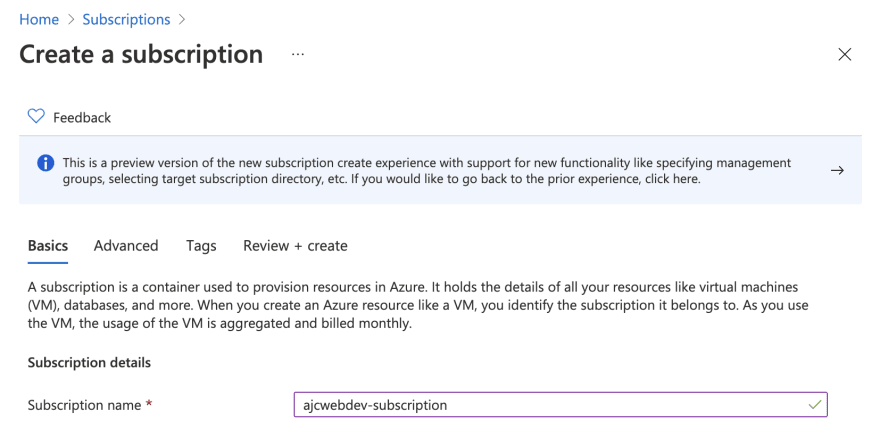36
a first look at azure functions
- Setup environment
- Install the Azure Functions Core Tools
- Create a local Functions project with
func init host.jsonlocal.settings.json
- Create an HTTP trigger function with
func newindex.jsfunction.json- Test function locally with
func start
- Create an Azure subscription
- Install the Azure CLI
- Check version number with
az version - Log in with
az login - Configure subscription with
az account set
- Create a function app
- Create a resource group with
az group create - Create a storage account with
az storage account create - Create a function app with
az functionapp create - Publish app with
func azure functionapp publish - Test deployed functions with curl
- Create a resource group with
The code for this article can be found on my GitHub.
brew tap azure/functions
brew install azure-functions-core-tools@3A Functions project directory contains host.json, local.settings.json, and subfolders with the code for individual functions.
func init ajcwebdev-azure \
--worker-runtime javascriptOutput:
Writing package.json
Writing .gitignore
Writing host.json
Writing local.settings.json
Writing /Users/ajcwebdev/ajcwebdev-azure/.vscode/extensions.jsonNavigate into the newly created project.
cd ajcwebdev-azureThe host.json metadata file contains global configuration options that affect all functions for a function app.
{
"version": "2.0",
"logging": {
"applicationInsights": {
"samplingSettings": {
"isEnabled": true,
"excludedTypes": "Request"
}
}
},
"extensionBundle": {
"id": "Microsoft.Azure.Functions.ExtensionBundle",
"version": "[2.*, 3.0.0)"
}
}The local.settings.json file stores app settings, connection strings, and settings used by local development tools.
{
"IsEncrypted": false,
"Values": {
"FUNCTIONS_WORKER_RUNTIME": "node",
"AzureWebJobsStorage": ""
}
}func new \
--template "Http Trigger" \
--name HttpTriggerOutput:
Select a number for template: Http Trigger
Function name: [HttpTrigger]
Writing
/Users/ajcwebdev/ajcwebdev-azure/HttpTrigger/index.js
Writing
/Users/ajcwebdev/ajcwebdev-azure/HttpTrigger/function.json
The function "HttpTrigger" was created successfully
from the "Http Trigger" template.Alternatively, you can run func new to see the list of available templates and enter 10 to select HTTP trigger.
// index.js
module.exports = async function (context, req) {
context.log('You did it!')
const name = (req.query.name || (req.body && req.body.name))
const responseMessage = name
? "Hello, " + name + ". It worked!"
: "It worked! Pass a name for a personalized response."
context.res = {
status: 200,
body: responseMessage
}
}In function.json we set req and res to the direction in and out. Requests can be get or post.
{
"bindings": [
{
"authLevel": "function",
"type": "httpTrigger",
"direction": "in",
"name": "req",
"methods": [
"get",
"post"
]
},
{
"type": "http",
"direction": "out",
"name": "res"
}
]
}To run a Functions project, run the Functions host. The host enables triggers for all functions in the project.
func startWhen the Functions host starts, it outputs the URL of HTTP-triggered functions:
Core Tools Version: 3.0.3477
Commit hash: 5fbb9a76fc00e4168f2cc90d6ff0afe5373afc6d (64-bit)
Function Runtime Version: 3.0.15584.0
Functions:
HttpTrigger: [GET,POST] http://localhost:7071/api/HttpTrigger
For detailed output, run func with --verbose flag.
If you look back at the terminal you will see the following output.
Executing 'Functions.HttpTrigger'
(
Reason='This function was programmatically called via the host APIs.',
Id=82dff9f9-6973-4275-8cd9-ff95524706b1
)
You did it!
Executed 'Functions.HttpTrigger'
(
Succeeded,
Id=82dff9f9-6973-4275-8cd9-ff95524706b1,
Duration=301ms
)Follow the instructions from the disembodied voice speaking from the void and enter a name query!

Alternatively, you can test the endpoints with curl.
curl --get http://localhost:7071/api/HttpTriggercurl --request POST http://localhost:7071/api/HttpTrigger \
--data '{"name":"ajcwebdev"}'To publish a function you must create a function app with an Azure subscription. A subscription is a container used to provision resources in Azure. It holds the details of all your resources such as VMs and databases.
When you create an Azure resource like a VM, you identify the subscription it belongs to so usage of the VM can be aggregated and billed monthly. You must use the Azure portal to create a subscription.

Select Subscriptions.

Click add.

Give your subscription a name.
There are numerous ways to install the Azure CLI depending on your development environment. I followed the instructions for installing with Homebrew on MacOS.
brew install azure-cliaz versionOutput:
{
"azure-cli": "2.27.2",
"azure-cli-core": "2.27.2",
"azure-cli-telemetry": "1.0.6",
"extensions": {}
}Log in to Azure with az login.
az loginIf you have Multi-Factor Authentication setup then you will need to use az login --tenant TENANT_ID to explicitly login to a tenant. You can find your tenant ID on the Azure Active Directory portal.
az account set \
--subscription ajcwebdev-subscriptionA function app maps to your local function project and lets you group functions as a logical unit for easier management, deployment, and sharing of resources. Before you can deploy your function code to Azure, you need to create three resources:
- Resource group - logical container for related resources
- Storage account - maintains state and other information about the functions
- Function app - environment for executing function code
The az group create command creates a resource group. Create a resource group named ajcwebdev-rg in the westus region.
az group create \
--name ajcwebdev-rg \
--location westusOutput:
{
"id": "/subscriptions/427c04b8-2468-4e47-9537-129b86bc7d3e/resourceGroups/ajcwebdev-rg",
"location": "westus",
"managedBy": null,
"name": "ajcwebdev-rg",
"properties": {
"provisioningState": "Succeeded"
},
"tags": null,
"type": "Microsoft.Resources/resourceGroups"
}The az storage account create command creates the storage account.
az storage account create \
--name ajcwebdevstorage \
--location westus \
--resource-group ajcwebdev-rg \
--sku Standard_LRSStandard_LRS creates a general-purpose storage account in your resource group and region.
The az functionapp create command creates the function app in Azure.
az functionapp create \
--resource-group ajcwebdev-rg \
--consumption-plan-location westus \
--runtime node \
--runtime-version 12 \
--functions-version 3 \
--name ajcwebdev-function-app \
--storage-account ajcwebdevstorageWe specify ajcwebdev-rg for the resource group, ajcwebdevstorage for the storage account, and ajcwebdev-function-app for the name of the function app.
The func azure functionapp publish command deploys your local functions project to Azure.
func azure functionapp publish ajcwebdev-function-appOutput:
Getting site publishing info...
Creating archive for current directory...
Uploading 1.63 KB
Upload completed successfully.
Deployment completed successfully.
Syncing triggers...
Functions in ajcwebdev-function-app:
HttpTrigger - [httpTrigger]
Invoke url: https://ajcwebdev-function-app.azurewebsites.net/api/httptrigger?code=qFdxLBSxkswsQ/NZIeooMTlC4WS9awDgaGZi/OJPqgUzcKQYFYIwJA==Enter the provided URL or add &name=person.


You can also view the home page of your function app at ajcwebdev-function-app.azurewebsites.net.

36
